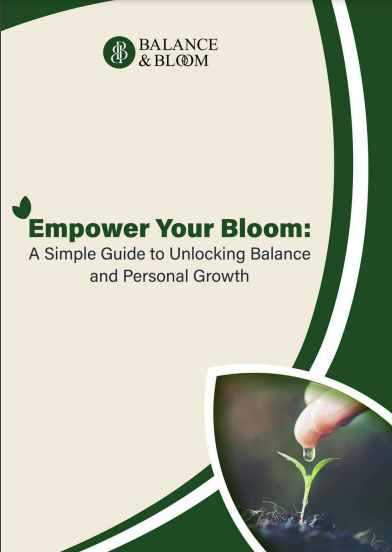Mindfulness is based on the idea of being fully present in the moment, giving your entire focus to it. Stress reduction, less anxiety, decreased blood pressure, and enhanced cardiovascular health are just a few of the myriad health advantages of mindfulness. But that’s not all.
With mindfulness, we have the opportunity to live a whole life in which we prosper professionally, have stronger relationships with ourselves and others, aim at long-term goals, experience more self-growth, and eventually achieve long-term success.
In this post, we will examine mindfulness’s transforming potential for professional success and discuss practical ways to incorporate it into your everyday practice.
Concentration and Achieving One's Career Goals
Mindfulness has far-reaching implications in the workplace with a view to gaining long-term goals. Individuals who cultivate a mindful mentality can realize their full potential and flourish in their vocations. Here’s how mindfulness promotes professional success:
- Improved Ability to Concentrate: Mindful meditation and deep breathing improve focus and concentration. Mindful meditation trains the mind to be present and alert, reducing workplace distractions and boosting productivity, aiming at long-term goals.
- Reduction of Stress: Common workplace stress can hinder performance and well-being. Mindfulness-based stress reduction (MBSR) helps manage stress and build resilience. People can handle stress better by observing their thoughts and feelings without getting caught up in them.
- Enhanced communication and collaboration: Mindfulness increases self-awareness and empathy, which are crucial for collaboration and communication. Active listening and nonjudgmental awareness improve teamwork and innovation by strengthening relationships with coworkers, clients, and stakeholders.
- Better Ability to Think Creatively and Solve Problems: Mindfulness fosters curiosity and receptivity to new experiences. By discarding preconceived beliefs and taking a fresh approach, people can unleash their creativity and solve challenging problems, cementing long-term success.
- Made Better Decisions: Clear and conscious decision-making helps you analyze choices. Before making a decision, pause and breathe to lessen impulsivity and evaluate the bigger picture. This can improve career results and decision-making and eventually lead you to long-term success. Mindfulness promotes balance, making difficult situations easier to handle.
- Improved Capacity for Emotional Intelligence: Mindfulness increases self-awareness and empathy, which are essential to emotional intelligence. By understanding your own and others’ emotions, you may improve your leadership and professional connections and prepare yourself best for your long-term goals. This awareness enhances communication, conflict resolution, and teamwork. Mindfulness can help leaders build a more respectful and accepting workplace.
- Reduced Conflict: Working in a team often brings challenges and disagreements. Research from the University of British Colombia reveals that team mindfulness can decrease or prevent some disputes. Since mindfulness helps team members stay focused on a task, they are less likely to get into personal conflicts with coworkers. Living in the present also reduces negative feelings like rage, reducing conflict escalation. You don’t want to eliminate all conflict in your company, but mindfulness can help you handle it better and more effectively.
- Improved productivity: Our workdays are filled with deadlines, distractions, relationships, and other stressors competing for our attention. Your employees may multitask to handle those pressures, but despite its appeal, multitasking is less productive.
By practicing mindfulness, you and your coworkers can learn to focus. Single-tasking improves long-term productivity, efficiency, and job quality. Aetna employees earned 62 minutes of productivity every week by participating in at least one mindfulness activity. The Aetna leadership team thought this was worth £2,400 per employee per year.
Finally, incorporating mindfulness into your work life can improve your performance and quality of life with a better success rate. Mindfulness can improve job success and well-being through mindful meditation, attentive breathing, or taking breaks throughout the day.
Using Mindfulness to Stay Present While Aiming for the Future
The importance of the current moment is often overlooked when pursuing long-term goals. However, these brief moments lay the groundwork for future achievement. Anchoring oneself in the now helps promote mindfulness that increases focus and aligns everyday actions with long-term goals. This alignment is essential to ensure that each action is intentional and advances the goal.

Consider these tips for using present awareness:
- Strategic Pauses: Taking little breaks during the day might help you focus and stay motivated. Before an important meeting, a professional may center themselves to ensure they are fully focused and acting in their career’s best interest.
- Reflective Journaling: Journaling daily events can clarify how present actions relate to future goals. A medical entrance exam student may notice how each study session advances their aim of becoming a doctor.
- Mindful Meditation: Regular meditation can enhance concentration, reduce stress, and encourage dedication to long-term goals. For entrepreneurs, Mindful meditation can help clear their thoughts and generate new ideas that advance their firm.
- Conscious decision-making: Making decisions with mindfulness guarantees that they are intentional and in line with one’s values and goals. Choosing to network over attending a casual social event can be a deliberate decision that helps a person achieve their professional development and long-term goals.
- Visualization Techniques: Visualizing successful goal achievement can boost motivation and strengthen the link between present and future actions. Athletes may picture reaching the finish line as motivation for their everyday training.
By incorporating these techniques into one’s daily routine, the present moment becomes a valuable ally on the path to success. Practicing mindfulness brings us closer to our long-term goals, demonstrating the power of the present.
Mindfulness Techniques for Resilience
Mindfulness techniques
Success often comes with challenges that test our resolve and adaptability. To overcome hurdles, we must develop resilience to face them head-on rather than escape them. We can increase resilience by incorporating mindfulness meditation practices into our regular routine. In order to cultivate a mindset that can withstand setbacks in our endeavors, it is crucial to practice mindfulness, which is the nonjudgmental observation of one’s thoughts, feelings, and experiences.
- Acceptance: To overcome obstacles, first embrace them. One mindfulness practice that can help is body scan meditation. Methodically focusing on distinct body parts helps one tolerate present discomforts or tensions without judgment, transferable to life’s obstacles.
- Centeredness: Maintaining focus in turmoil is essential. Using techniques like Focused Breathing can assist in maintaining equilibrium. By focusing on the breath, people may stay present and reduce stress.
- Perspective Shift: Mindfulness aids viewpoint change. Mindful observation, which involves observing colors, sounds, and smells without assigning meaning, might help individuals see challenges as chances for progress.
- Emotional Regulation: Mindful Maintaining emotional regulation requires listening to one’s internal conversation. It entails observing thoughts and emotions without being swept up by them, enabling more measured responses to problems.
- Compassionate Detachment: Fostering Compassionate Detachment via Kindness Meditation promotes a balanced approach to problem-solving by empathizing with situations without being overwhelmed.
Example: Consider the situation of a professional facing a tight project deadline. They can maintain calmness by using focused breathing and mindful meditation, body scan meditation to accept stress without panic, mindful observation to see the deadline as an opportunity to excel, mindful listening to avoid negative self-talk, and loving-kindness meditation to approach the task with self-compassion and determination.
Individuals can use these practices to create a reservoir of inner power that reverses the tide in their favor, changing obstacles into stepping stones that lead to the peak of their goals. Integrating mindfulness into a success mindset enhances the journey toward goals by providing clarity, purpose, and well-being.
Building Mindfulness Relationships for Success
The art of conversation is essential for both professional and personal development. It is more than just the exchange of words; it is also the underlying intent, attention, and respect that each person offers to the conversation. When conducted mindfully, this sophisticated dance of verbal and nonverbal cues has the potential to convert simple conversations into powerful conduits for connection, understanding, and mutual accomplishment.
- Active Listening: True engagement starts with listening—not simply hearing words but digesting the message. A manager who listens to team members’ concerns can prevent conflicts from escalating, promoting trust and proactive problem-solving.
- Non-Verbal Communication: Unspoken words often speak volumes. A steady stare and open stance during a negotiation can show confidence and openness, encouraging collaboration rather than confrontation.
- Empathetic Response: Empathy is the link that binds divergent viewpoints. By appreciating a colleague’s point of view with comments like “I understand where you’re coming from,” one might pave the way for more inclusive and inventive solutions.
- Clarity and Brevity: Clear communication is crucial in today’s information-rich society. A well-written, to-the-point email respects the recipient’s time and increases the likelihood of a timely and intelligent response.
- Feedback Loop: Carefully offered constructive feedback can accelerate growth. Leaders who frame feedback as a shared path to greatness rather than a critique inspire their teams to improve.
Individuals and organizations can create a culture of mindful communication by incorporating these techniques into regular encounters, fostering sustained success and deep relationships.



